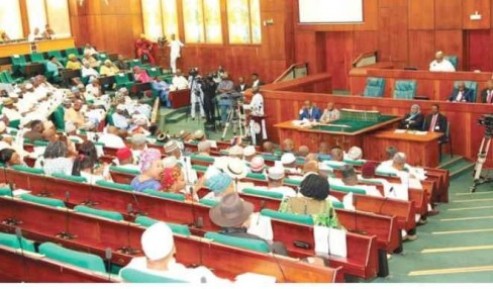
LAGOS JULY 14TH (NEWSRANGERS)-It seemed the triumph of people’s power as both chambers of the National Assembly, yesterday, buckled to strident opposition from the public and key stakeholders to the Nigeria Press Council (NPC) and National Broadcasting Commission (NBC) Amendment Bill, as well as the nomination of Lauretta Onochie as Commissioner of the Independent National Electoral Commission (INEC).
A day after national dailies boldly printed ‘Information Blackout’ on their front pages to raise support against the proposed NPC/NBC amendment bill that would allow authorities to control the press and shrink civic space, Segun Odebunmi, the lawmaker sponsoring the bill, yesterday said the House of Representatives has agreed to stay action on it.
Odebunmi, who is the Chairman House of Representatives Committee on Information National Orientation Ethics and Values, told Channels TV that the suspension was necessary for proper consultation over the bill while appearing on Sunrise Daily.
“We have been on this process for a while and right now, we have suspended it for more consultation to happen on it,” he said.
The lawmaker had earlier faulted claims that the Bill was targeted at gagging the media. He rather maintained that it is aimed at removing identified hindrances to optimum performance.
Lawmakers said the bills are intended to curb fake news, but critics said the bills would give authorities the power to hit media outlets and journalists with huge fines and give journalists up to three years in jail.
While the Federal Government already regulates broadcast media organisations through the NBC, it now seeks to extend regulations to online platforms.
In June, the government suspended the operations of social media giant, Twitter, over what it described as national security concerns. Subsequently, all social media platforms were asked to register with the NBC, while all broadcast stations were ordered to stop using Twitter.
Media sanctions have become more frequently discussed since President Muhammadu Buhari was first elected in 2015. Between 2017 and 2019, lawmakers considered a bill to regulate social media, and another bill proposing death penalty for anyone promoting hate speech. Both bills were suspended after public outcries.
Human rights lawyer, Femi Falana, has stressed the need for members of Newspapers Proprietors Association of Nigeria (NPAN), Nigeria Union of Journalists (NUJ) and Nigeria Guild of Editors (NGE) to develop new code of conduct for the media to self-regulate.
Speaking at the 13th Wole Soyinka Centre Media Lecture Series in Lagos yesterday, he advised that “you have to self-regulate. There is a lot of mess going on. If you don’t self-regulate, they are going to regulate you. NPAN, NUJ and NGE should meet urgently and come up with new code of conduct. Because today, one or two people can sit down in the house and set up an online medium and begin to send messages, some of which are meant to blackmail.”
Speaking further, he said: “They have just approved a budget of N4.8 billion to the security forces to monitor your telephone conversations and WhatsApp so that when you are communicating and they sense the message is dangerous, you are going to be arrested. Have no fear because by virtue of Section 37 of the Constitution, your right to telephone and your correspondence are protected. The money has been voted, but we are not going to allow them spend the money.”
The Guardian










